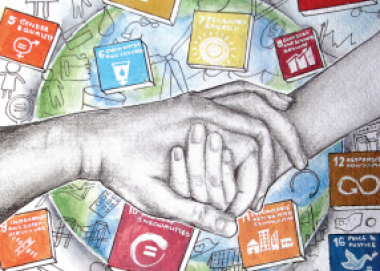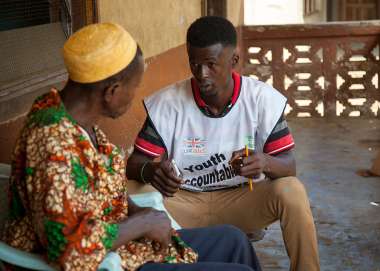Achieving the SDGs would go a long way towards ending poverty and making a reality of human rights for all. But according to a 2019 UN expert review of progress against three critical goals, the situation is “bleak”.
Falling behind hits the most marginalised hardest
Lack of progress is stark. For SDG 13 (combatting climate change), national commitments still fall well short of what’s needed. There is also far to go on SDG 16 (peaceful and inclusive societies) - almost 70.8 million people had been forcibly displaced by persecution, conflict, violence or human rights violations by the end of last year. SDG 10 (inequalities within and among countries) is not faring much better, with income inequality rising in many parts of the world, and the countries of the global South still significantly under-represented in the governance of international organisations.
Christian Aid’s experience has shown us that this lack of progress is most keenly felt by people in the global South, and particularly women and others who are marginalised. Some gains in reducing extreme poverty mask a rise in inequality almost everywhere, and this is slowing progress. Lack of adequate data may mean that inequality is even higher: many marginalised people are invisible in headline statistics.
Transparency and accountability to reveal and reduce disparities
Voluntary National Reviews, in which countries report their progress towards the SDGs, often focus on successes. They nearly always fall short in acknowledging threats to progress on the SDGs, like human rights abuses faced by the most marginalised. Comprehensive national reporting is essential to revealing disparities and making progress towards closing the gaps. To ensure accountability, reporting needs to cover all goals and targets, to address gender and the commitment to ‘leave no-one behind’, and be based on disaggregated data.
Under the principle of common but differentiated responsibilities, the wealthiest countries should be leading the way on SDG implementation. But they have not always been transparent or accountable about the quality and quantity of their contributions to implementing and monitoring the SDGs, which include aid targets and financing for development.
Overall, systems are inadequate for calling governments to account for their responsibilities. In particular, existing accountability systems are nationally focused, which means they overlook cross-border issues and contradictions such as when achievements in one area undermine progress in others.
Reforming oversight of the SDGs: what is needed?
This month, during the UN General Assembly, a process will be announced to review the High Level Political Forum (HLPF), which has oversight of the SDGs.
The HLPF has the potential to ensure transparent, accountable delivery of the SDGs, in line with the principles on which they were based: upholding human rights, leaving no-one behind and common but differentiated responsibilities. This review will make or break the next decade of action for sustainable development.
Our new briefing paper, Keeping the SDGs on Track, outlines how HLPF accountability mechanisms can be improved in ways that put these basic principles into practice. During the UN General Assembly, Christian Aid staff will participate in several important high-level summits and meetings, putting the case for better accountability. In this and our future work, we will continue to advocate for the rights of the most marginalised.
The spirit and intention of the SDGs is to end the privileges and power imbalances that have contributed to global inequality. Better accountability mechanisms will re-set the SDGs on a rights-based and justice-oriented pathway.



